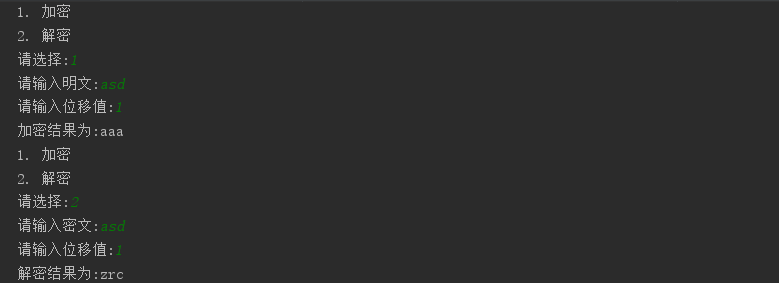作业来源:https://edu.cnblogs.com/campus/gzcc/GZCC-16SE1/homework/2684
1.字符串操作:
解析身份证号:生日、性别、出生地等
# 获取身份证号中的出生地与性别 identy = input("请输入您的身份证号:") while (len(identy)!=18): print("您的身份证号码输入错误") identy = input("请重新输入您的身份证号:") birthplace = input("请输入你的出生地:") print("你的出生地是{}".format(birthplace)) sex = identy[-2] if int(sex) % 2 == 0: print("性别为女") else: print("性别为男")

凯撒密码编码与解码
def encryption(): str_raw = input("请输入明文:") k = int(input("请输入位移值:")) str_change = str_raw.lower() str_list = list(str_change) str_list_encry = str_list i = 0 while i < len(str_list): if ord(str_list[i]) < 123-k: str_list_encry[i] = chr(ord(str_list[i]) + k) else: str_list_encry[i] = chr(ord(str_list[i]) + k - 26) i = i+1 print ("加密结果为:"+"".join(str_list_encry)) def decryption(): str_raw = input("请输入密文:") k = int(input("请输入位移值:")) str_change = str_raw.lower() str_list = list(str_change) str_list_decry = str_list i = 0 while i < len(str_list): if ord(str_list[i]) >= 97+k: str_list_decry[i] = chr(ord(str_list[i]) - k) else: str_list_decry[i] = chr(ord(str_list[i]) + 26 - k) i = i+1 print ("解密结果为:"+"".join(str_list_decry)) while True: print (u"1. 加密") print(u"2. 解密") choice = input("请选择:") if choice == "1": encryption() elif choice == "2": decryption() else: print (u"您的输入有误!")

网址观察与批量生成
import webbrowser as web url = 'http://news.gzcc.cn/html/xiaoyuanxinwen/' web.open_new_tab(url) for i in range(2, 4): web.open_new_tab('http://news.gzcc.cn/html/xiaoyuanxinwen/'+str(i)+'.html') for i in range(2, 10): url = 'http://news.gzcc.cn/html/xiaoyuanxinwen/{}.html'.format(i) print (url)

2.英文词频统计预处理
下载一首英文的歌词或文章或小说。
将所有大写转换为小写
将所有其他做分隔符(,.?!)替换为空格
分隔出一个一个的单词
并统计单词出现的次数
#获取单词函数定义 def getTxt(): txt = open('English.txt').read() txt = txt.lower() for ch in '!"@#$%^&*()+,-./:;<=>?@[\]_`~{|}': #替换特殊字符 txt.replace(ch, ' ') return txt #1.获取单词 EnglishTxt = getTxt() #2.大写字母转换成小写字母 exchange = EnglishTxt.lower() print(exchange) #3.切割为列表格式 txtArr = EnglishTxt.split() #4.遍历统计 counts = {} for word in txtArr: counts[word] = counts.get(word, 0) + 1 #5.转换格式,方便打印,将字典转换为列表 countsList = list(counts.items()) countsList.sort(key=lambda x:x[1], reverse=True)#按次数从大到小排序 #6.打印 for i in range(10): word, count = countsList[i] print('{0:<10}{1:>5}'.format(word,count))

3.文件操作
同一目录、绝对路径、相对路径
#相对路径 open('English.txt') #相对路径 open('/untitled/English.txt') #绝对路径 open('C:UsersAdministratorPycharmProjectsuntitledEnglish.txt')
凯撒密码:从文件读入密函,进行加密或解密,保存到文件。
file=open("mima.txt",'r') text=file.read() file.close miwen = '' for i in text: miwen += chr(ord(i)+6) print("文章加密后为:",miwen) file=open("mima.txt",'w') file.write(miwen) file.close()

词频统计:下载一首英文的歌词或文章或小说,保存为utf8文件。从文件读入文本进行处理。
# coding=utf-8 file = open("English.txt") text = file.readline() file.close() s = ",.?!" for i in s: text = text.replace(i, " ") text1 =text.lower().split() count = {} for j in text1: try: count[j] = count[j] + 1 except KeyError: count[j] = 1 print(count)
4.函数定义
加密函数
def encryption(): str_raw = input("请输入明文:") k = int(input("请输入位移值:")) str_change = str_raw.lower() str_list = list(str_change) str_list_encry = str_list i = 0 while i < len(str_list): if ord(str_list[i]) < 123-k: str_list_encry[i] = chr(ord(str_list[i]) + k) else: str_list_encry[i] = chr(ord(str_list[i]) + k - 26) i = i+1 print ("加密结果为:"+"".join(str_list_encry))
解密函数
def decryption(): str_raw = input("请输入密文:") k = int(input("请输入位移值:")) str_change = str_raw.lower() str_list = list(str_change) str_list_decry = str_list i = 0 while i < len(str_list): if ord(str_list[i]) >= 97+k: str_list_decry[i] = chr(ord(str_list[i]) - k) else: str_list_decry[i] = chr(ord(str_list[i]) + 26 - k) i = i+1 print ("解密结果为:"+"".join(str_list_decry))
读文本函数
def read() : f = open('C:UsersAdministratorPycharmProjectsuntitled.English.txt','r') # data = f.read(10000) # print(data)